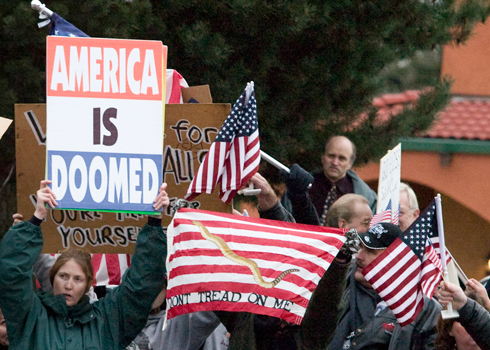Members of the Westboro Baptist Church have the right to protest at the funerals of members of the military, the Supreme Court ruled Wednesday.
“Simply put, the church members had the right to be where they were,” Chief Justice John Roberts wrote on behalf of the majority. “Westboro alerted local authorities to its funeral protest and fully complied with police guidance on where the picketing could be staged. The picketing was conducted under police supervision some 1,000 feet from the church, out of the sight of those at the church. The protest was not unruly; there was no shouting, profanity, or violence.”
The court’s decision came after a hearing on the case of Albert Snyder, the father of a Marine who sued the church for picketing his son’s funeral in October. There was universal condemnation of the Church’s message, but ultimately the court found that the First Amendment protected the church’s porotests.
“While these messages may fall short of refined social or political commentary, the issues they highlight — the political and moral conduct of the United States and its citizens, the fate of our Nation, homosexuality in the military, and scandals involving the Catholic clergy — are matters of public import,” Roberts wrote.
“Westboro believes that America is morally flawed; many Americans might feel the same about Westboro. Westboro’s funeral picketing is certainly hurtful and its contribution to public discourse may be negligible,” Roberts wrote. “But Westboro addressed matters of public import on public property, in a peaceful manner, in full compliance with the guidance of local officials. The speech was indeed planned to coincide with Matthew Snyder’s funeral, but did not itself disrupt that funeral, and Westboro’s choice to conduct its picketing at that time and place did not alter the nature of its speech.”
“Speech is powerful. It can stir people to action, move them to tears of both joy and sorrow, and — as it did here — inflict great pain,” Roberts wrote. “On the facts before us, we cannot react to that pain by punishing the speaker. As a Nation we have chosen a different course — to protect even hurtful speech on public issues to ensure that we do not stifle public debate.”
Justice Samuel Alito was the lone dissenter in the 8-1 decision.
“In order to have a society in which public issues can be openly and vigorously debated, it is not necessary to allow the brutalization of innocent victims like petitioner,” Alito wrote.






